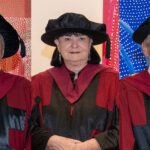Two Curtin University researchers and one initiative have been named finalists in the 2012 WA Science Awards.
The WA Science Awards are a State Government initiative rewarding excellence across science research, engagement and education, and promoting the importance of science and innovation in the State.
Professor Graeme Wright, Deputy Vice-Chancellor Research and Development, said the finalists’ accomplishments are testament to Curtin’s strong history of achievement in science and the outstanding outcomes being achieved across the institution.
“These finalists are in the midst of reaching new science frontiers. They are communicating the world’s biggest radio astronomy project to the community, addressing the need for clean and renewable energy solutions, and looking at new ways to create community engagement in science,” he said.
Professor Steven Tingay, Director of the Curtin Institute of Radio Astronomy and Deputy Director of the International Centre for Radio Astronomy Research, is a finalist in the Science Ambassador of the Year Award.
Professor Tingay has played a key role in communicating the significance of radio astronomy and the Square Kilometre Array project to the public, the science community, industry and to government at a state, national and international level.
A finalist for the Early Career Scientist of the Year Award, Dr Mark Paskevicius, from Curtin’s Fuels and Energy Technology Institute undertakes research aimed at addressing the global need for clean and renewable energy, specifically through the creation of economically viable and practically feasible hydrogen storage systems.
Finally, an initiative developed through the International Centre for Radio Astronomy, in which Curtin is an equal partner, is a finalist in the Science Engagement Initiative of the Year category.
This initiative, called theSkyNet, allows the public to donate their spare computing power to help process radio astronomy data. It aims to raise the public profile of science and radio astronomy while simultaneously creating a research-grade data processing resource for scientists.
The winners of the 2012 WA Science Awards will be announced 11 October.
The awards were established in 2002 to honour the outstanding achievements of Western Australia’s science and innovation community.
Contact:
Megan Meates, Public Relations, Curtin University
Tel: 08 9266 4241, Mobile: 0401 103 755, Email: megan.meates@curtin.edu.au


